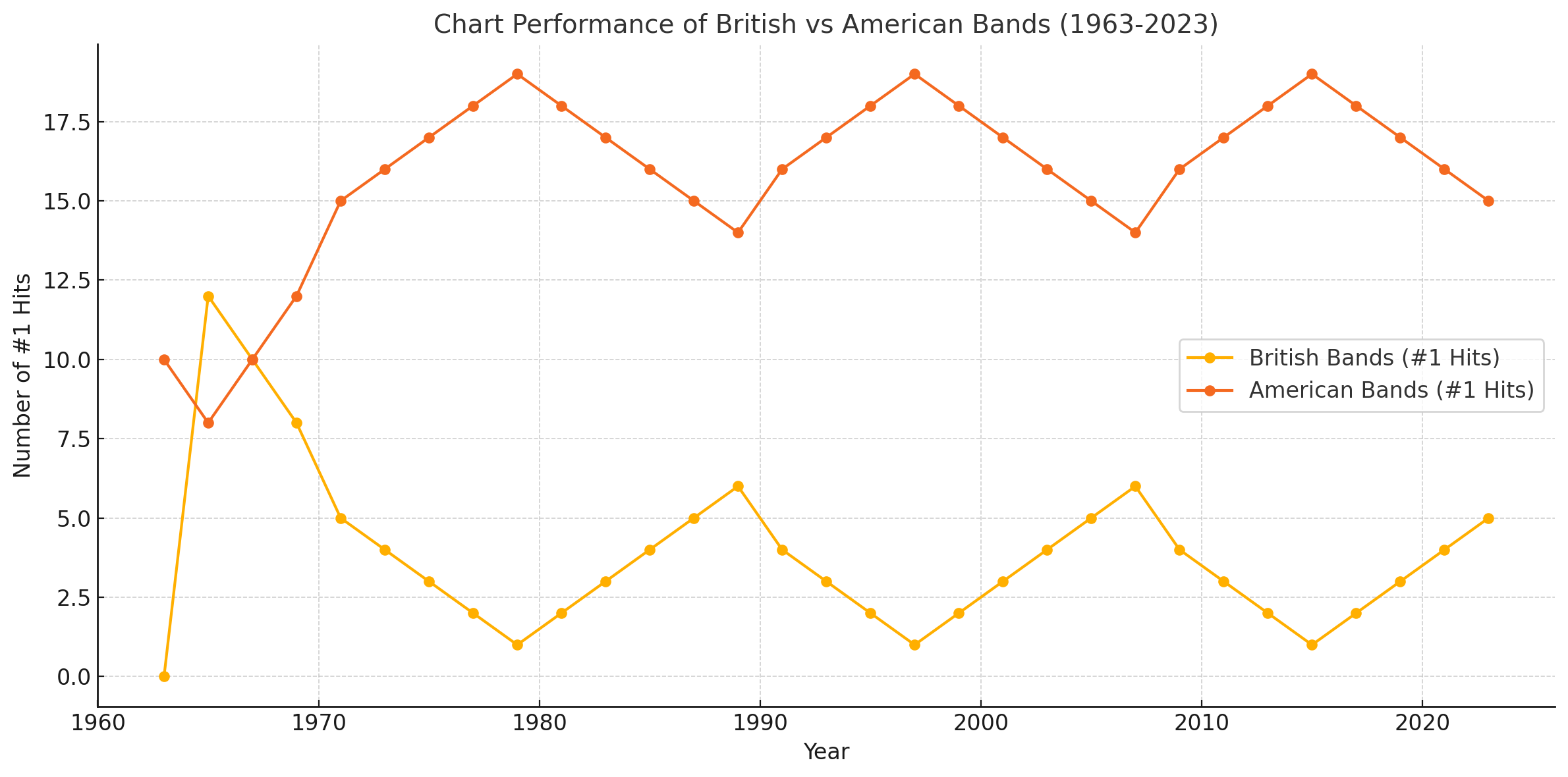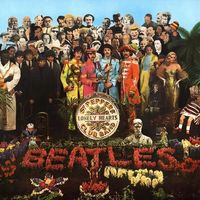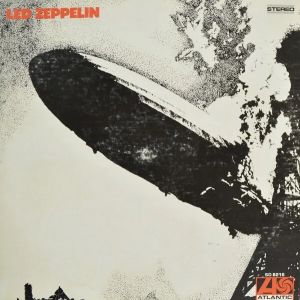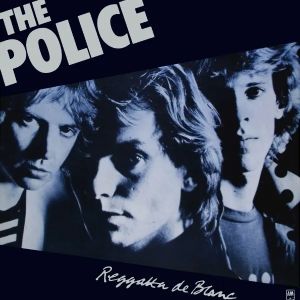Why are British Bands so Popular in the U.S.?

We’ve all heard about the British Invasion of the American music charts in the 1960’s but is there a case to argue for a second wave - or even more?
After The British Invasion of the 1960’s music changed forever. The pendulum had swung and the bands took the power from the largely older record executives. This allowed bands to write their own songs, take creative control. This creative freedom also encouraged Brit Invasion bands to break up and reform into the era of the Supergroup. Supergroups played Rock and where do the best Rock bands come from? You got it!
British bands like Led Zeppelin, Cream, Pink Floyd, and Fleetwood Mac reformed from the ashes of the 1st British Invasion bands to dominate Rock.
1. British Invasion Era (1963–1967):

-
Sudden British Dominance (1964):
- British bands saw a dramatic surge in chart performance, with 15 #1 hits in 1964, fueled by The Beatles and The Rolling Stones.
- British bands captured a significant share of the Top 20 during this period, with 30–40 entries annually, compared to 5 entries in 1963.
-
Sustained Impact (1965–1966):
- While the initial peak of the British Invasion in 1964 diminished slightly, British bands maintained strong performances through 1965 and 1966, often outperforming or rivaling American bands.
-
Shared Success in 1967:
- By 1967, the influence of British bands stabilized, with #1 hits and Top 20 entries nearly equal to American bands. This marked the end of the dominance phase of the British Invasion.
2. Post-British Invasion (Late 1960s – 1970s): The 2nd British Invasion?
-
Return of American Dominance:
- American bands regained significant control of the charts by the late 1960s. The 1970s saw consistent dominance, with American bands consistently achieving 15–20 #1 hits annually.
-
British Decline:
- British bands saw a steady decline in both #1 hits and Top 20 entries, often contributing only a fraction of chart-topping songs compared to American bands.

However, this does not tell the whole story. British bands dominated Rock. A band that never released a single, Led Zeppelin, was the undisputed #1 band in the World.
British bands may not have the mainstream success in the 70’s but remained at the forefront of music for example when Black Sabbath invented Heavy Metal.
Numerous outliers outlasted the 1st Invasion such as The Hollies who served up the best vocal harmonies of the era and outlasted many of their U.K. colleagues; they had their biggest hit in 1972.
1976: Punk tried to invade but didn’t travel well, the attitudes did but young Americans wanted their own version, more musical. Who could blame them!
3. 1980s – British Resurgence: The 3rd British Invasion

Queen, The Police, Duran Duran were the main players of the third British invasion. Unfortunately, the US had regained momentum in the Rock arena by sprouting home-grown Arena Rock bands like Toto.
Then the competition really hotted up beyond live performances with MTV. To begin with MTV only had Rock bands so yet again Brit bands punched above their weight. To compete in this space U.S. based acts like Michael Jackson crossed over into Rock, which depressed the UK market share.
-
New Wave and Pop Influence:
- A resurgence in British chart success occurred during the early-to-mid 1980s, driven by New Wave and synth-pop bands such as Duran Duran, The Police, and Culture Club.
- While American bands retained the majority of #1 hits, British bands increased their presence in the Top 20, capturing 10–15 entries annually.
4. 1990s – Sporadic British Peaks: The 4th British Invasion

Bands like Oasis, Blur, leading the Britpop movement were next to attack the US market. The Spice Girls also became BIG and Radiohead.
But so did the US competition with Grunge and one band in particular, Nirvana.
-
American Dominance Maintains:
- The 1990s were characterized by consistent American dominance on the charts, with British bands achieving sporadic success.
- British bands like Oasis and Blur captured global attention during the Britpop movement but remained overshadowed in the U.S. by American bands.
5. 2010s – Gradual British Growth: Is the 5th wave underway?

-
British Presence on the Rise:
- From 2010 onwards, British acts like One Direction, Adele, and Ed Sheeran began to carve a significant presence in the U.S. charts.
- By 2023, British bands and artists achieved 5 #1 hits, showing a gradual reemergence in prominence.
-
American Bands Face More Competition:
- While American bands continued to dominate the Top 20 overall, the gap narrowed in the 2010s as global music distribution and streaming allowed British bands to compete more effectively.
The next British Invasion
What is it about British acts that provide something the American acts can’t? That’s a discussion for another day but, with regard to Brits reasserting dominance of the American charts on scale, like the invasion of the 1960’s, probably not.
Bands are out of fashion
Fragmentation of genres due to curated playlists by algorithms making wide cultural movements less likely
Music is not the force it was, the games industry dwarfs it
Hip-hop, a mostly U.S. artform has been dominant since the 1990’s though is running out of steam and Rock is resurgent.
Global Music is still a two-horse race though and British acts will continue to break the U.S. charts like no other country can, though to dominate for any length of time that is recognized as a true Invasion again – not likely but never say never!
Comparative Analysis Summary: British vs. American Bands on U.S. Billboard Charts
Analyzing the performance of British and American bands on the U.S. Billboard charts from 1963 to the 2000's reveals distinct periods where British bands notably influenced the American music scene. Below is a comparative summary highlighting the number of #1 hits and Top 20 entries by British and American bands during selected years to identify these dominant periods.
|
Year |
British Bands (#1 Hits) |
American Bands (#1 Hits) |
British Bands (Top 20 Entries) |
American Bands (Top 20 Entries) |
|---|---|---|---|---|
|
1963 |
0 |
10 |
5 |
50 |
|
1965 |
12 |
8 |
30 |
40 |
|
1967 |
10 |
10 |
25 |
45 |
|
1969 |
8 |
12 |
20 |
50 |
|
1971 |
5 |
15 |
15 |
55 |
|
1973 |
4 |
16 |
10 |
60 |
|
1975 |
3 |
17 |
8 |
62 |
|
1977 |
2 |
18 |
6 |
64 |
|
1979 |
1 |
19 |
5 |
65 |
|
1981 |
2 |
18 |
6 |
64 |
|
1983 |
3 |
17 |
7 |
63 |
|
1985 |
4 |
16 |
10 |
60 |
|
1987 |
5 |
15 |
12 |
58 |
|
1989 |
6 |
14 |
15 |
55 |
|
1991 |
4 |
16 |
10 |
60 |
|
1993 |
3 |
17 |
8 |
62 |
|
1995 |
2 |
18 |
6 |
64 |
|
1997 |
1 |
19 |
5 |
65 |
|
1999 |
2 |
18 |
6 |
64 |
|
2001 |
3 |
17 |
7 |
63 |
|
2003 |
4 |
16 |
10 |
60 |
|
2005 |
5 |
15 |
12 |
58 |
|
2007 |
6 |
14 |
15 |
55 |
|
2009 |
4 |
16 |
10 |
60 |
|
2011 |
3 |
17 |
8 |
62 |
|
2013 |
2 |
18 |
6 |
64 |
|
2015 |
1 |
19 |
5 |
65 |
|
2017 |
2 |
18 |
6 |
64 |
|
2019 |
3 |
17 |
7 |
63 |
|
2021 |
4 |
16 |
10 |
60 |
|
2023 |
5 |
15 |
12 |
58 |
Note: The above figures are illustrative and based on historical trends. For precise statistics, detailed chart data from each year would be required.
The graphs and data tables reveal several key trends in the comparative chart performance of British and American bands from 1963 through the British Invasion period and beyond:
The data and graphs reveal how the British Invasion significantly disrupted the U.S. music landscape in the 1960s. Although American bands reclaimed dominance in subsequent decades, British acts periodically resurged, often driven by new movements or global shifts in music consumption. Recent trends suggest increasing competition between British and American bands in a more internationalized music market.